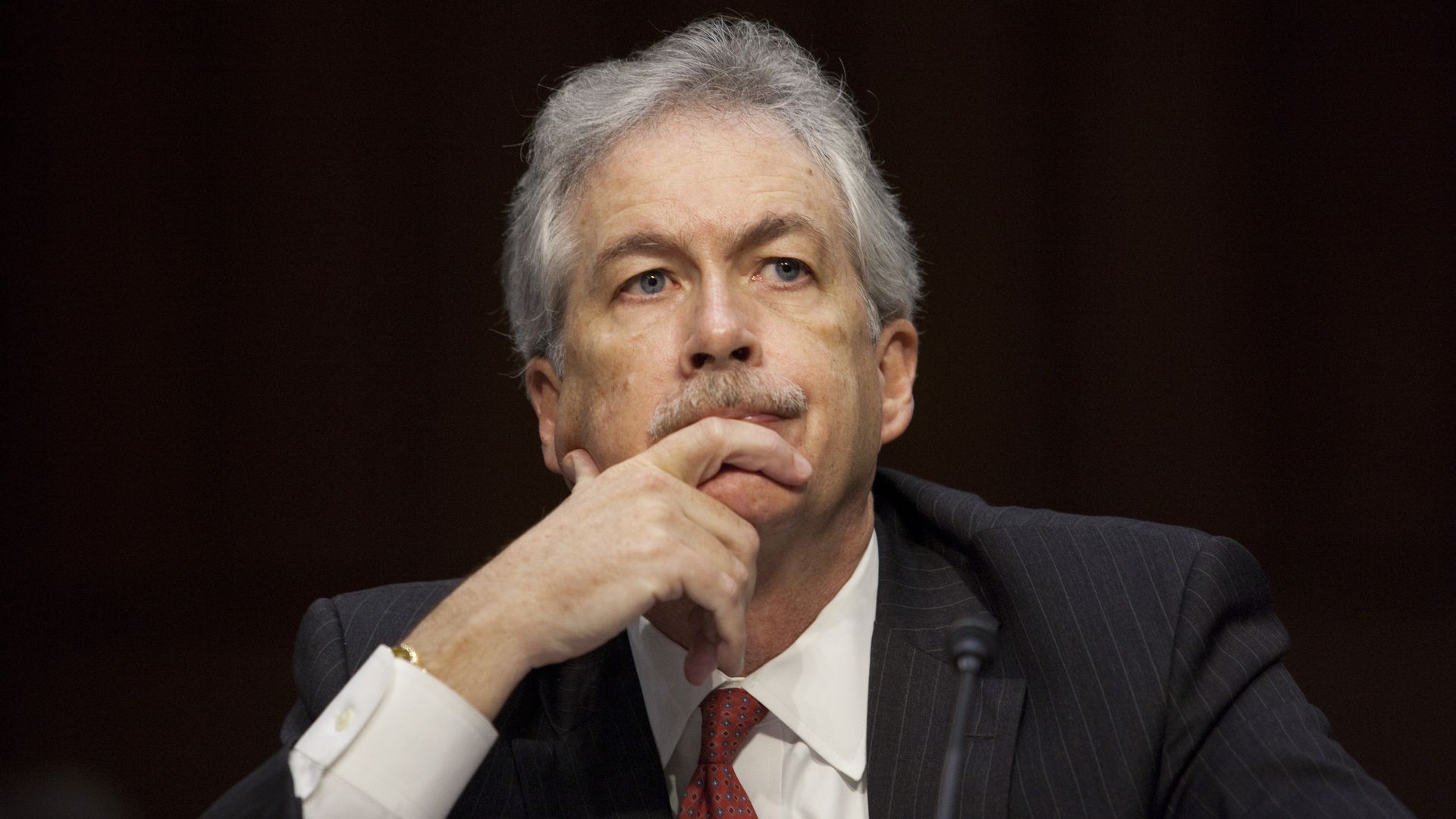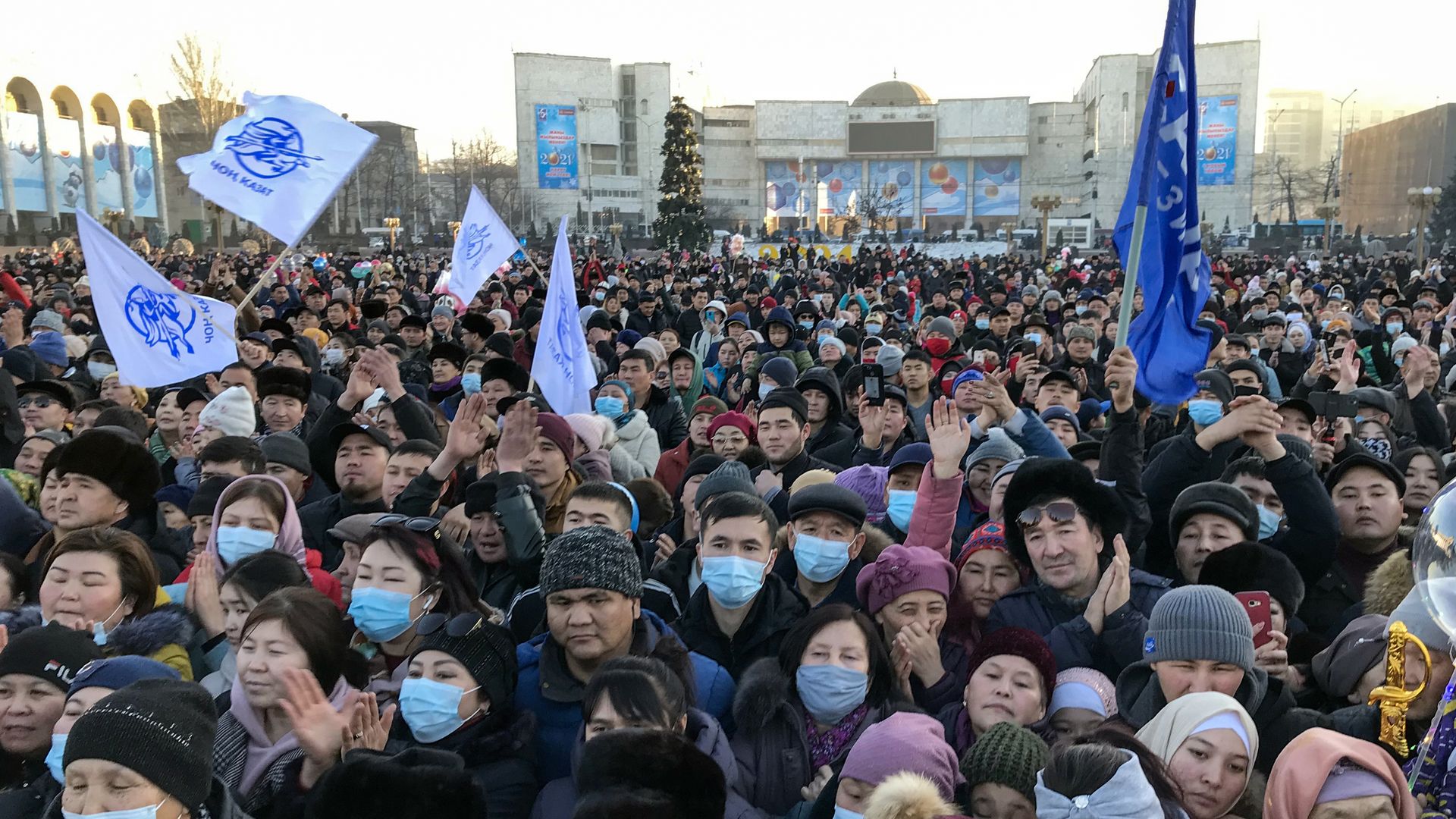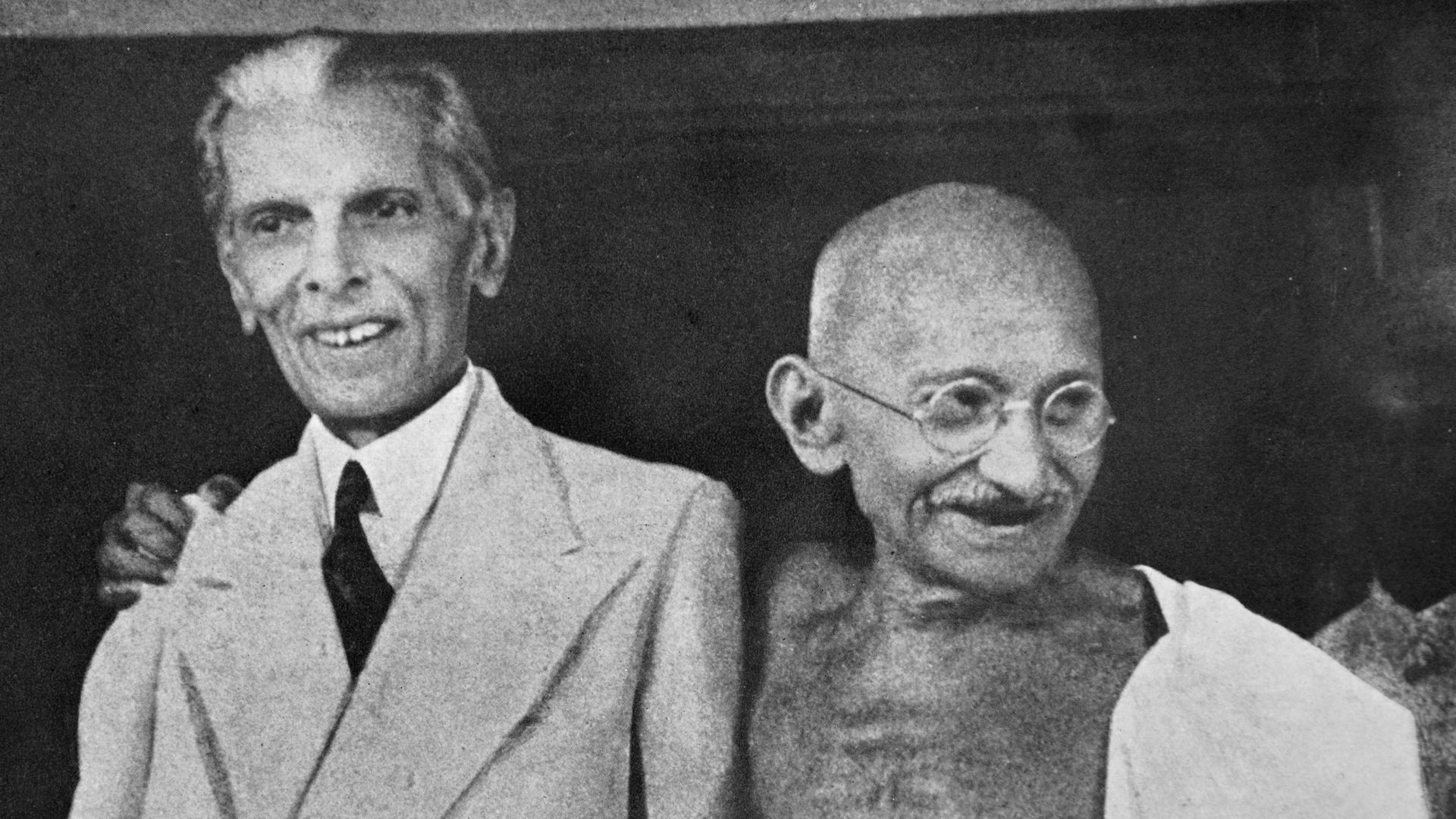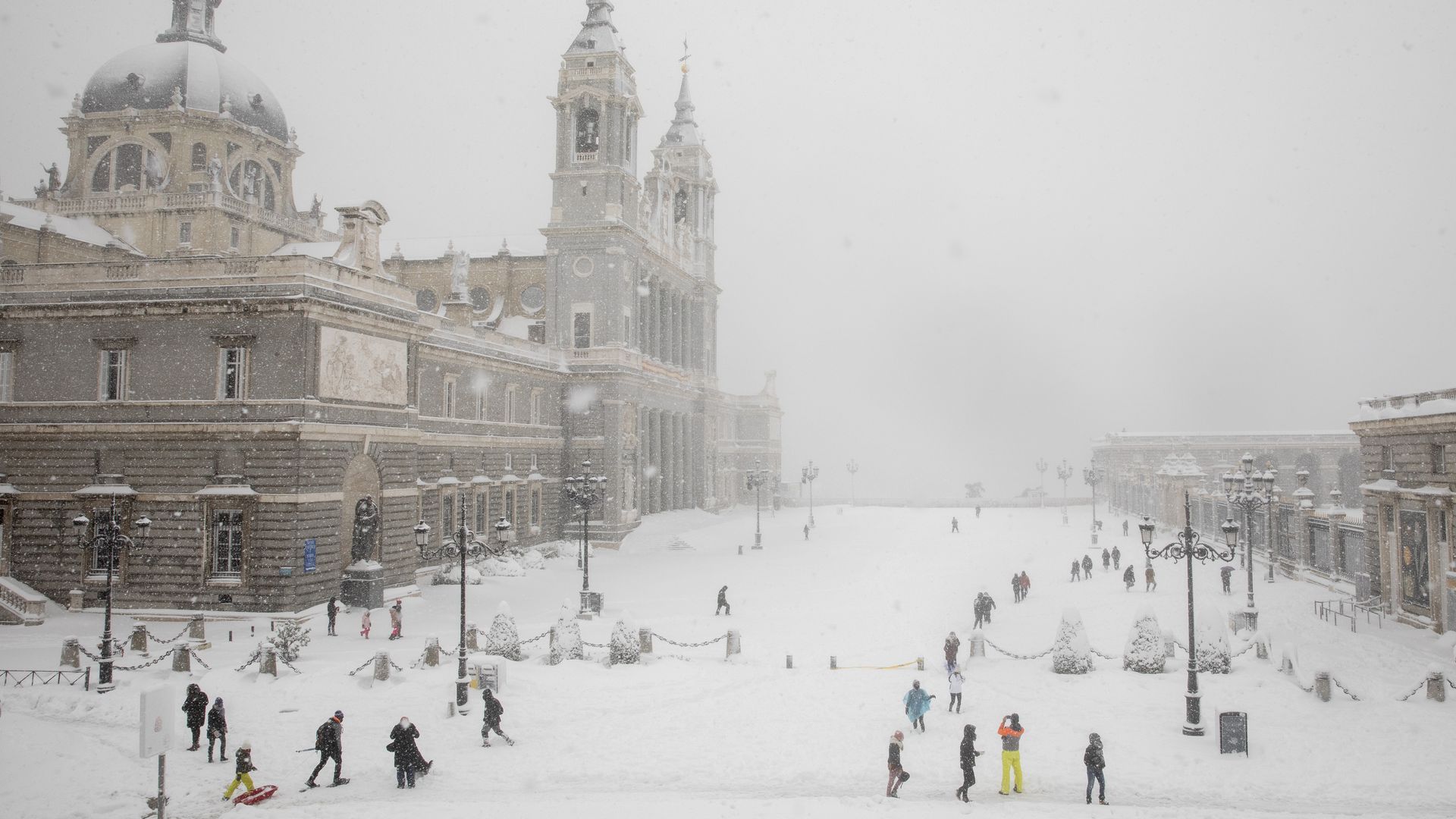| | | | | | | Presented By Babbel | | | | Axios World | | By Dave Lawler ·Jan 11, 2021 | | Welcome back to Axios World. - Tonight we're looking at the Trump administration's last-minute moves, Biden's pick to run the CIA, and rapid political rise in Kyrgyzstan (1,500 words, 5½ minutes).
New arrival? Sign up here. | | | | | | 1 big thing: Pompeo's last-minute moves |  | | | Photo: Patrick Semansky/Pool/AFP via Getty | | | | Secretary of State Mike Pompeo declared Yemen's Houthi rebels a terror group, labeled Cuba a state sponsor of terrorism and risked provoking China by lifting restrictions on interactions between U.S. and Taiwanese officials — all within 48 hours, and with less than two weeks left in President Trump's term. Why it matters: The administration, and in particular Pompeo, has made little secret of the fact that it's trying to tie President-elect Biden's hands, in particular when it comes to Trump's hardline policies on Iran and China. Bipartisan concerns are bubbling up on Capitol Hill over the sudden shifts across so many areas with so little time left, and without evidence of in-depth planning and coordination. - "I don't know if it's the fact that it's the transition and folks have left, or if they are just desperately trying to push things across before Jan. 20. It just seemed like there was a lack of preparedness on both of these issues," one congressional aide told me, describing a contentious State Department briefing to committee staff today on the Yemen and Cuba moves.
- The moves, driven primarily by Pompeo, come at a time when Trump himself seems to have largely disengaged from foreign policy.
- They follow several other shifts in long-standing U.S. policy — most notably the recognition of Moroccan sovereignty in Western Sahara — that have come during the transition.
The other side: "We've taken note of these last-minute maneuvers, one of which" — the Houthi designation — "is operative on Jan. 19," a Biden transition official told Axios. The official added that the transition was reviewing each policy and would determine whether to keep or reverse them, based on "the national interest." Driving the news: The Houthi designation has sparked particular outrage because it comes after weeks of warnings that such a step would impede the international response to the world's most dire humanitarian crisis and make a peace deal harder to reach. - Background: The Houthis toppled Yemen's government in 2014, and a Saudi-led bombing campaign since then has largely failed to dislodge them. Biden said during the campaign that he would end U.S. support for that campaign.
Cuba's state sponsor of terrorism designation had been lifted in 2015 by Barack Obama as part of a détente policy that Biden seems inclined to resume. - The Trump administration had previously reversed several of Obama's other policies toward Cuba, and today added Cuba back to the terror sponsor list alongside Iran, North Korea and Syria.
Pompeo also lifted four-decade-old restrictions on official government visits to Taiwan — the self-governing island that is claimed by China. - China's Foreign Ministry issued a threatening response on Monday, warning the U.S. to "refrain from going further down the wrong and dangerous path."
The Pentagon, meanwhile, has continued to reduce troop numbers in Afghanistan toward a target of 2,500 by Jan. 15, despite a provision in the defense spending law — approved by Congress on Jan. 1 over Trump's veto — intended to stop him from doing so, Reuters reports. - The law requires the Pentagon to provide a detailed rationale before accessing funds to lower troop levels below 4,000.
- The Pentagon told Reuters on Monday that there had been no orders to slow the withdrawal, and one official added that the troop count was already down to around 3,000.
The bottom line: The administration is clearly more focused on pushing its policies as far as they can go before Jan. 20 than on ensuring a smooth transition. |     | | | | | | 2. Behind the scenes: Yemen call devolves into shouting match |  | | | Houthi rebels in 2014. Photo: Stringer/Anadolu Agency/Getty Images | | | | A call the State Department held this morning to brief House and Senate committee staff on the Yemen move left staffers from both parties shocked by the apparent lack of a plan to ensure that food and aid continue to reach Yemeni civilians, millions of whom are already on the verge of famine. What they're saying: "People on both sides of the aisle felt very frustrated that this was done in such a haphazard way. I don't mean to be dramatic, but this could kill people," one congressional aide briefed on the call told Axios. - At one point on the call, briefers from the United States Agency for International Development (USAID) acknowledged that the policy could result in a loss of life, according to the aide.
Humanitarian groups active in Yemen have been pleading for months with the Trump administration not to take the step Pompeo announced today, arguing it would force them to either curtail the aid and services they provide or risk potential U.S. prosecution. - Oxfam said in a statement Monday that the move would "block U.S. humanitarian aid, goods, and personnel from entering northern Yemen, where 70% of the population lives, and substantially reduce them throughout the rest of the country," seriously hampering efforts to fight hunger, cholera and COVID-19.
- David Miliband, the CEO of the International Rescue Committee, called Pompeo's step an act of "pure diplomatic vandalism" that would make crucial work in Houthi-held areas "all but impossible" and ultimately cause unnecessary deaths.
Go deeper |     | | | | | | 3. Biden picks a veteran diplomat to run CIA |  | | | Burns at a hearing in 2012. Photo: Drew Angerer/Getty Images | | | | Biden today announced Bill Burns as his pick to lead the CIA. - Burns, a former ambassador to Russia and Jordan who helped open the backchannel negotiations that led to the Iran nuclear deal, would be the first career diplomat to lead the agency.
- He currently serves as the president of the Carnegie Endowment for International Peace.
I interviewed Burns during an Axios event in September. Here's what he had to say on a few key issues: - On Iran: Burns said Biden's efforts to bring Iran back into compliance with the nuclear deal would be "easier said than done" and should be paired with "an immediate negotiation to try to strengthen and extend" the deal's timelines while pushing back against Iran's broader behavior.
- On Russia: "We're going to be operating within a pretty narrow band of possibilities in dealing with Vladimir Putin's Russia, from the sharply competitive to the very nastily adversarial," Burns said, adding that it was nonetheless important to "preserve some guardrails in that relationship," including over nuclear arms control.
- On North Korea: Burns said it would be "very difficult" to reach any nuclear arms deal with Kim Jong-un, but that the most important first step would be to re-engage with U.S. allies, most notably Japan and South Korea.
Watch |     | | | | | | A message from Babbel | | Start speaking a new language in three weeks | | |  | | | | In 2021, let language take you places with Babbel. The background: This language learning app gives you bite-sized, manageable lessons in a variety of languages. It'll have you speaking the basics in three weeks. Sign up today and get 60% off. | | | | | | 4. Global elections roundup |  | | | An election night rally for Japarov in Bishkek. Photo: Andrei Berets/TASS via Getty | | | | 1. Kyrgyzstan elected as its next president a populist who was sprung from jail during a post-election uprising in September. - Sadyr Japarov's rapid rise has been accompanied by rumors of links to organized crime, but he won 80% of the vote and also had a ballot measure approved to enhance the powers of the president.
- Japarov, who had been jailed on kidnapping charges he says were politically motivated, campaigned promising swift economic relief.
2. Facebook banned several Ugandan government accounts ahead of Thursday's election, for "coordinated inauthentic behavior." - The election pits longtime leader Yoweri Museveni, 76, against Bobi Wine, the charismatic 38-year-old singer-turned-opposition leader.
- Wine has faced arrest and intimidation as he has mounted the strongest challenge Museveni has faced in years.
- Worth noting: His campaign anthem has been stuck in my head all day.
3. Vietnam's ruling Communist Party will select its new leadership at a party conference to be held Jan. 25–Feb. 2. - "The leadership reshuffle has been the subject of internal party jockeying in the months leading up and intense speculation among Vietnam's 97m people," per the FT.
- Nguyen Phu Trong, the unusually powerful general secretary, is barred from seeking a third term under party rules, though "analysts have not ruled out the possibility that he might seek to stay on," per the FT.
|     | | | | | | 5. Tracking Biden's calls |  | | | Photo: Saul Loeb/AFP via Getty Images | | | | Biden has held phone calls with the leaders of 17 countries as well as the EU, NATO and UN during the transition. He also called Pope Francis. Why it matters: The calls, which were spread over several weeks though they generally came in response to congratulatory messages, give an early indication of Biden's aims to rebuild relations with allies and prioritize ties with fellow democracies. The big picture: Biden placed calls to America's neighbors (Mexico and Canada), Five Eyes intelligence partners (Australia, Canada, New Zealand and the U.K.), several European allies (France, Germany, Ireland and Italy) and treaty allies in Asia (Japan and South Korea). - He called the leaders of three countries in the Americas (Argentina, Chile and Costa Rica), two in Africa (Kenya and South Africa) and two in the Middle East (Israel and Jordan), as well as India.
The other side: There are some glaring absences on this list, in addition to the other "great powers," China and Russia. - Biden didn't call President Jair Bolsonaro of Brazil, a staunch Trump ally. He also skipped over the Gulf, and in particular Saudi Arabia. Turkish President Recep Tayyip Erdoğan didn't get a call either.
|     | | | | | | 6. What I'm reading: "The Nine Lives of Pakistan" |  | | | Pakistan's founding father Mohammed Ali Jinnah (L) with Mohandas Gandhi in 1944, prior to partition. Photo: Universal History Archive via Getty | | | | Declan Walsh spent 10 years in Pakistan as a foreign correspondent with The Guardian and NY Times, before being expelled from the country under mysterious circumstances in 2013. Walsh looks back over that chaotic decade of uprisings and assassinations in "The Nine Lives of Pakistan," reflecting on the question of how the country has held together as long as it has and examining the circumstances of his own expulsion. - The book may have been a slightly unusual pick for some light Christmastime reading, but it's fast-paced and full of fascinating vignettes.
- Most of all, it made me realize that the perceptions I had of Pakistan — defined by rivalry with India, steered by an overly powerful military, navigating uncomfortable alliances with both the U.S. and extremist groups — were far from inevitable, and only part of the story.
- It's a worthwhile read for anyone curious about Pakistan's past, and its future.
|     | | | | | | 7. Stories we're watching |  | | | A snowy Saturday in Madrid. Photo: Pablo Blazquez Dominguez/Getty Images | | | - Food costs are rising all over the world
- Jared Kushner briefed Jake Sullivan
- Acting Homeland Security secretary steps down
- U.S. sanctions 7 Ukrainians over election interference
- Kim Jong-un calls U.S. "our biggest enemy"
- U.K. approves Moderna vaccine; sees record death toll
- Cracks in nuclear command and control
Quoted: "They are completely untrustworthy. If they were able to create a vaccine ... why do they want to give it to us? Why don't they use it themselves?" — Ayatollah Ali Khamenei on Friday, banning the distribution of U.S.- and U.K.-made vaccines in a surprise move |     | | | | | | A message from Babbel | | Start the new year with a new language | | |  | | | | In 2021, let language take you places with Babbel. The background: This language learning app gives you bite-sized, manageable lessons in a variety of languages. It'll have you speaking the basics in three weeks. Sign up today and get 60% off. | | | | | | Axios thanks our partners for supporting our newsletters.
Sponsorship has no influence on editorial content. Axios, 3100 Clarendon Blvd, Suite 1300, Arlington VA 22201 | | | You received this email because you signed up for newsletters from Axios.
Change your preferences or unsubscribe here. | | | Was this email forwarded to you?
Sign up now to get Axios in your inbox. | | | | Follow Axios on social media:    | | | | | |











No comments:
Post a Comment